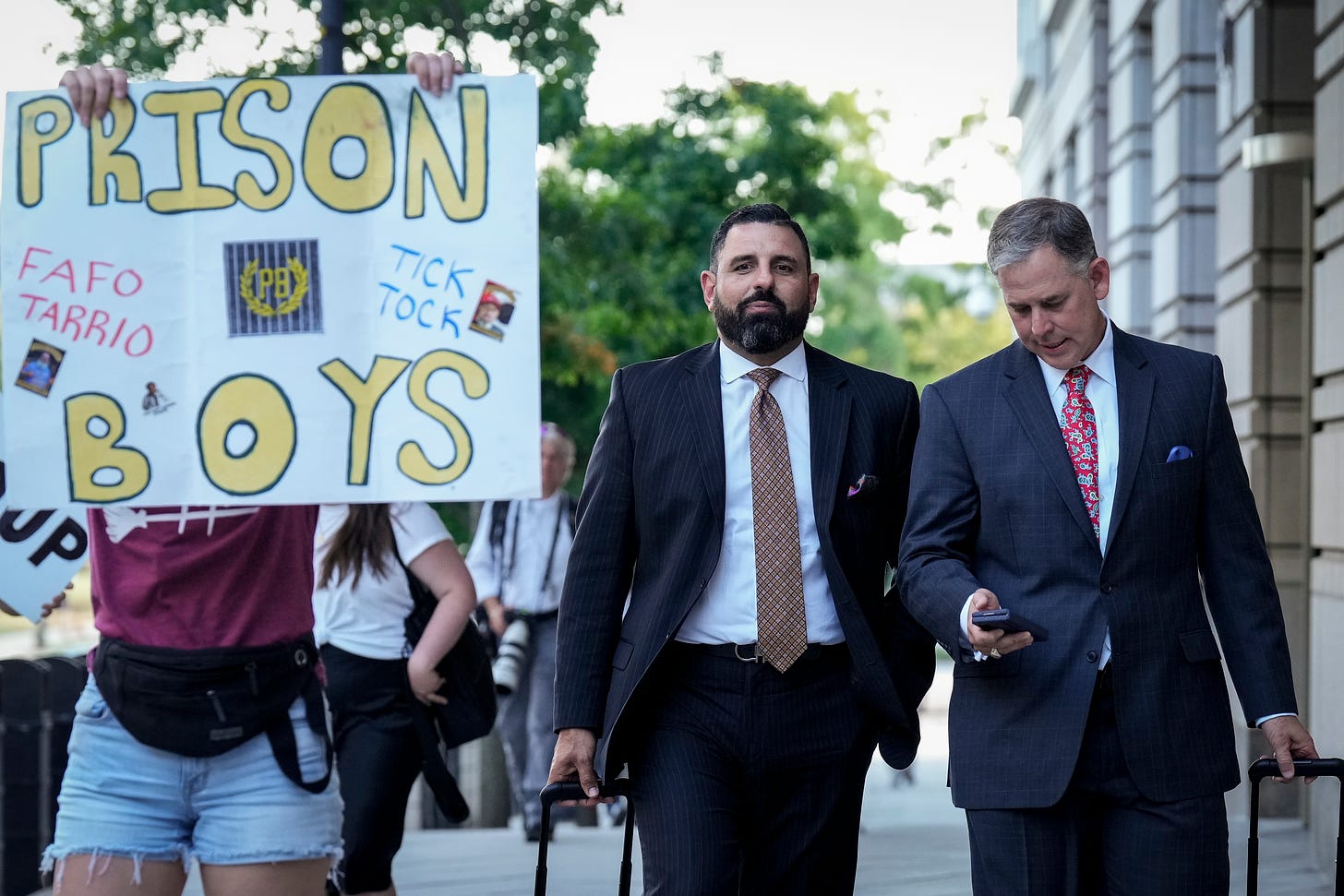
Is This the Real Reason Trump Promises to Pardon Jan. 6th Convicts?
He should be asked about it at this week’s debate.

THERE’S A PROMISE DONALD TRUMP keeps making on the campaign trail that every reporter who interviews him—and the moderators of Tuesday night’s debate, David Muir and Linsey Davis of ABC News—should question him about: that he will pardon convicted January 6th criminals. He repeated this pledge over the weekend, in a two-hour rant in Wisconsin on Saturday:
The moment we win, we will rapidly review the cases of every political prisoner unjustly victimized by the Harris regime, and I will sign their pardons on Day One. Right? Day One.
To a former prosecutor, Trump looks to be doing something even worse than reinforcing the backward-looking narrative that the January 6th Capitol invaders were patriots. By dangling in this way the prospect of a pardon, he appears to be looking to a future where he may well want these loyalists back on the street and acting on his behalf again—organized paramilitary groups performing sanctioned acts of violence.
If past is prologue and Trump loses the election, is there any reason to think he won’t enlist violent right-wingers to challenge the outcome during the weeks between Election Day and January 6, 2025?
And is there any reason to think that, if he wins the election, he won’t condone any use of private violence against his critics and opponents after January 20, 2025?
History tells us that dictators mobilize official and nonofficial state violence by signaling impunity for the foot soldiers who commit crimes to intimidate dissenters and keep the population in line. Autocrats erasing accountability for lawless loyalists keeps them primed to take violent action without lasting consequences.
The young Nazi party of the 1920s lent muscle to its run-up to power in Germany with its infamous “brownshirts,” who quickly went from “a small group of bully-boys” to “a major paramilitary movement” eager to do whatever the party needed, no matter how violent or lawless. Today in Russia, Vladimir Putin has no need of a paramilitary force to stifle dissent, but he has intelligence and state security operatives eager to do his off-the-books bidding. Recall last month’s Russia-American prisoner swap; as part of that deal, Germany released Russian FSB assassin Vadim Krasikov, convicted of the 2019 Berlin murder of a self-exiled Russian dissident leader in broad daylight.
At the time of his original sentencing, Krasikov correctly predicted that “the Russian Federation will not leave me to rot in jail.” His accurate forecast reflects the nuts and bolts of Putin’s machinery for assassinating his opponents, both those at home in Russia and those who have fled overseas. Russian assassins know that if caught, they will ultimately be freed, as Krasikov was, and honored.
Now examine the parallel method to Trump’s madness. Let’s start back with Trump’s September 30, 2020 debate with Joe Biden. Moderator Chris Wallace asked Trump if he would condemn white supremacists and militant groups. Trump used the question as a springboard to his obviously scripted call to the extremist Proud Boys to “stand by and stand back.”
In the days that followed, he claimed he didn’t know “who Proud Boys are,” amended his debate remarks to say that “they have to stand down,” and lumped them in with the KKK in a blanket statement of condemnation. But the Proud Boys heeded and celebrated his initial invitation, then “stood by” for weeks until January 6th, when they spearheaded the Capitol violence. Leaders of the group have since been sent to prison for seditious conspiracy and other charges.
Throughout this campaign, Trump has been promising to pardon people convicted in connection to January 6th. He has called the convicts “warriors,” “unbelievable patriots,” and “hostages, not prisoners”; his allies have talked about them as heroes and martyrs, and honored them with nightly vigils.
Like Putin’s security operatives, Trump’s violent loyalists hear his beck and call. Don’t take my word for it. Check out the in-court statement of John Banuelos, who stands accused of firing a gun in the mob outside the Capitol on January 6th. At his arraignment in May, Banuelos told federal district court Judge Tanya Chutkan, “Trump is going to be in office in six months, so I have nothing to worry about.” Joseph Biggs, one of those Proud Boys leaders now in prison for seditious conspiracy, has said, “Oh, I know he’ll pardon us. . . . I believe that with all my heart.”
AUTHORITARIANS USE HENCHMEN, official and unofficial, to do the dirty work of intimidating citizens into obedience and silence. Those foot soldiers are willing to break the law because they believe they can act without true accountability.
It may seem bonkers for a candidate who claims to believe in law and order to talk about pardoning violent insurrectionists, including those who assaulted police with flagpoles, bike racks, stolen police shields, and bear spray.
But as we know, Trump doesn’t really believe in law and order. He only believes in himself.
So on Tuesday, Muir and Davis should give us the bookend to Wallace’s 2020 debate question. They should ask if Trump’s pledge to pardon those attacking Capitol Police and the nation on January 6th is meant to signal that they can count on him to get them off the hook if they serve as his street-muscle in the future.
However he replies, we know that they’ll be listening.
















